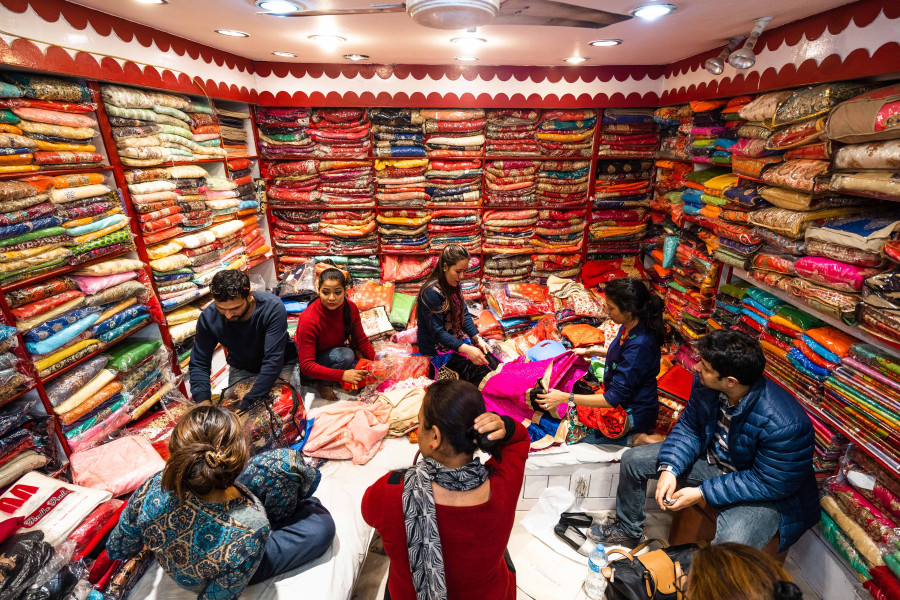Money
Dashain shoppers will have to brace for higher prices
A hike in import duty, weakened Nepali rupee against the dollar and higher transportation costs prompted by the virus outbreak have made Dashain goods, mainly apparels, dearer.
Krishana Prasain
Dashain shoppers planning to buy new clothes from international brands will have to carry fatter wallets as prices are set to swell by at least 25 percent, further hurting already bleak consumer sentiments caused by the Covid-19 pandemic, traders said.
A hike in import duty, weakened Nepali rupee against the dollar and higher transportation costs prompted by the virus outbreak have made Dashain goods, mainly apparels, dearer.
Bharat Karki, senior secretary of the Nepal Trans-Himalayan Border Commerce Association, a grouping of importers, said Chinese clothing would cost 20-25 percent more.
Karki said the dollar had appreciated, the government had jacked up the import duty and Covid-19 had pushed up freight charges. A bleak consumer sentiment prevails in the market, he added. Covid-19 has made tens of thousands of people jobless while many companies were forced to cut the salaries of their employees.
“The clothing business may contract by 60-70 percent this Dashain with a fall in demand. People’s purchasing capacity has fallen as the virus stopped economic activities for more than five months,” he said.
Apparel imports have also declined sharply compared to last year.
Bachhu Poudel, president of the association, said the crossing points on the northern border were expected to open partially from Friday. Traders said a large number of cargo containers were stranded on the Chinese side, and if the goods did not arrive in time for the festival shopping season, it would make no sense.
Traders in the Kathmandu Valley would now be shipping clothes across the country targeting Dashain shoppers, he said, but they have not received the goods ordered last December.
Due to a rising Covid-19 caseload in the valley, traders from other parts of the country who should be coming here for festival goods are staying away for fear of infection, he said.
Almost 2,000 containers holding clothes, shoes, cosmetics, electronics and industrial raw materials are stuck at the Chinese border. "People want to buy newly arrived goods during Dashain, and there will be less to choose from this year as a result," he said. “Big traders are reporting a 25-30 percent drop in business.”
Dhiraj Shrestha, president of the Ranjana Traders Association, said that sales were down to 25-30 percent of usual levels.
“Our goods are held up in Kerung, and we do not know when they will arrive,” he said. Most of them include fashionable clothes as sales of such items soar during Dashain when people splurge on new dresses.
But footfall is down and business is expected to be slower this year, he said. With goods remaining for a long time at customs, prices will increase automatically, he added. “Most of the goods ordered from China by traders at the Ranjana trade centre have arrived,” he said.
Summer goods that were ordered before the lockdown have not arrived and traders have not placed any orders for winter, he said.
According to Poudel, 1,500-2,000 containers of goods meant for Dashain such as clothes and shoes used to come from Kerung and Tatopani and by ship and air cargo too due to which there used to be an overflow of goods during Dashain in past years.
Garment merchants stock up on inventory from mid-April to mid-July in preparation for the Dashain and Tihar shopping spree. But due to the lockdown in the country, they could not do so.
According to the association, imported clothes account for around 70 percent of the readymade garment market in Nepal as there is little domestic production.
Nearly 80 percent of the readymade garments sold in the Kathmandu Valley are imported from China. The rest come from India, Bangladesh, Thailand, Vietnam and Indonesia. Imports from these countries have fallen to almost zero as the shipments come by air cargo, he said.
According to the Trade and Export Promotion Centre, the country imported apparels and accessories worth Rs24 billion in the last fiscal year 2019-20, a sharp decline compared to the previous fiscal year when imports hit Rs31.82 billion.




 20.53°C Kathmandu
20.53°C Kathmandu















